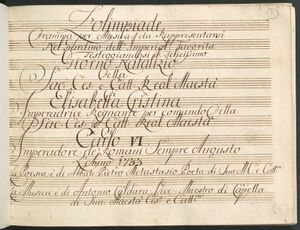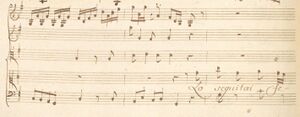Lo seguitai felice (Antonio Caldara)
| L'olimpiade | |
|---|---|
| opera seria by Antonio Caldara | |
 Title page of the manuscript, 1733, Vienna [1] | |
| Translation | dt.: Olympisches Jahrfest |
| Librettist | Pietro Metastasio |
| Language | Italian |
| Premiere | August 30, 1733 Wien |
"Lo seguitai felice" is an aria sung by the character Megacles (Italian: Megacle)(German: Megacles) in Antonio Caldara's L'olimpiade (Antonio Caldara). The libretto was created by Pietro Metastasio; Caldara's opera was the first time that his L'olimpiade was set to music.
The role of Megacle was sung by Felice Salimbeni, 21 at the time.[2]
"Lo seguitai felice" appears on the following album:
| Year | Album | Ensemble | Conductor |
|---|---|---|---|
| 2010 | Caldara in Vienna (Album) | Concerto Köln | Emmanuelle Haïm |
Libretto
from L'olimpiade
Antonio Caldara (music), Pietro Metastasio (words)
(Lasciar l'amico! Ah così vil non sono.) | |
Ha! leave my friend! | |
(Leave a friend! So base I am not.) | |
(Den Freund verlassen! Nein diese Verrähtlichkeit werde ich nicht begehen.) | |
(Ich solle meinen Freund verlassen? nein, so niederträchtig bin ich nicht.) | |
Context
The Aria appears in ACT III, Scene III of Caldara's L'Olimpiade. Craufurd Tait Ramage contextualizes Metastasio's aria - the motive of the true friend sticking with his friend through difficult times - with other poetry of similar content, which most certainly was known to Metastasio as well. The most prominent here is probably Shakespeare's from Timon of Athens:
"I am not of that feather, to shake off
My friend, when he must need me. I do know him,
A gentleman that well deserves a help,
Which he shall have ; I'll pay the debt and free him."
Manuscripts and sheet music

- Deutsches Libretto 1:
- Olympisches Jahr-Fest. Welsch-gesungener vorgestellet. Von Antonio Caldara in Music verfasset
- Verlag: Ghelen
- Österreichische Nationalbibliothek
- 1733
- Olympisches Jahr-Fest. Welsch-gesungener vorgestellet. Von Antonio Caldara in Music verfasset. Vienna: Gehlen, 1733.[6]
- Deutsches Libretto 2:
- Das olympische Jahrsfest, ein Singspiel, vorgestellet auf der privilegirten Schaubühne nächst der kaiserl. Burg im Jahr 1764. In das Deutsche übertragen von J. A. E. v. G.
- Verlag: Ghelen
- Österreichische Nationalbibliothek
- 1764
- Das olympische Jahrsfest, ein Singspiel, vorgestellet auf der privilegirten Schaubühne nächst der kaiserl. Burg im Jahr 1764. In das Deutsche übertragen von J. A. E. v. G. Vienna: Gehlen, 1764.[7]
- Italian Libretto:
- "L'olimpiade, Vienna, van Ghelen, 1733". Progetto Metastasio. Retrieved October 1, 2023.[3]
- Score:
- Copyist Copyist of Vienna
- Publisher Info. Manuscript, n.d.(ca.1733).
- Misc. Notes Österreichische Nationalbibliothek, Vienna (A-Wn): Mus.Hs.17164
- Contains ballets composed by Nicola Matteis Jr..
- Work Title L'olimpiade
- Composer Caldara, Antonio
- I-Catalogue Number IAC 161
- Movements/Sections 3 acts
- Year/Date of Composition 1733
- First Performance 1733-08-30 in Vienna, Teatro della Favorita
- Librettist Pietro Metastasio (1698-1782)
- Language Italian
- Composer Time Period Baroque
- Piece Style Baroque
- Instrumentation 7 vocal soloists, mixed chorus (SATB), orchestra
References
- ↑ 1.0 1.1 1.2 L'olimpiade (Caldara, Antonio). Vienna: Manuscript, 1733.
- ↑ "Booklet Caldara in Vienna" (PDF). Idagio. Archived (PDF) from the original on October 1, 2023. Retrieved October 1, 2023.
- ↑ 3.0 3.1 "Progetto Metastasio". Landing Page. Retrieved October 1, 2023.
- ↑ Hoole, John (1800). Dramas and other poems of the Abbé Pietro Metastasio. Translated from the Italian by John Hoole Vol. I. Stanford University: Otridge and Son, London.
- ↑ Ramage, Craufurd Tait (1875). Beautiful Thoughts from German and Spanish Authors. Universitätsbibliothek Bern.
- ↑ 6.0 6.1 Olympisches Jahr-Fest. Welsch-gesungener vorgestellet. Von Antonio Caldara in Music verfasset. Vienna: Ghelen, Österreichische Nationalbibliothek. 1733.
- ↑ 7.0 7.1 Das olympische Jahrsfest, ein Singspiel, vorgestellet auf der privilegirten Schaubühne nächst der kaiserl. Burg im Jahr 1764. In das Deutsche übertragen von J. A. E. v. G. Vienna: Gehlen, 1764.
External links
- "Booklet Caldara in Vienna" (PDF). Idagio. Archived (PDF) from the original on October 1, 2023. Retrieved October 1, 2023.
- "Progetto Metastasio". Landing Page. Retrieved October 1, 2023.
- "L'olimpiade (Metastasio)". Wikiwand. Archived from the original on October 1, 2023. Retrieved October 1, 2023.